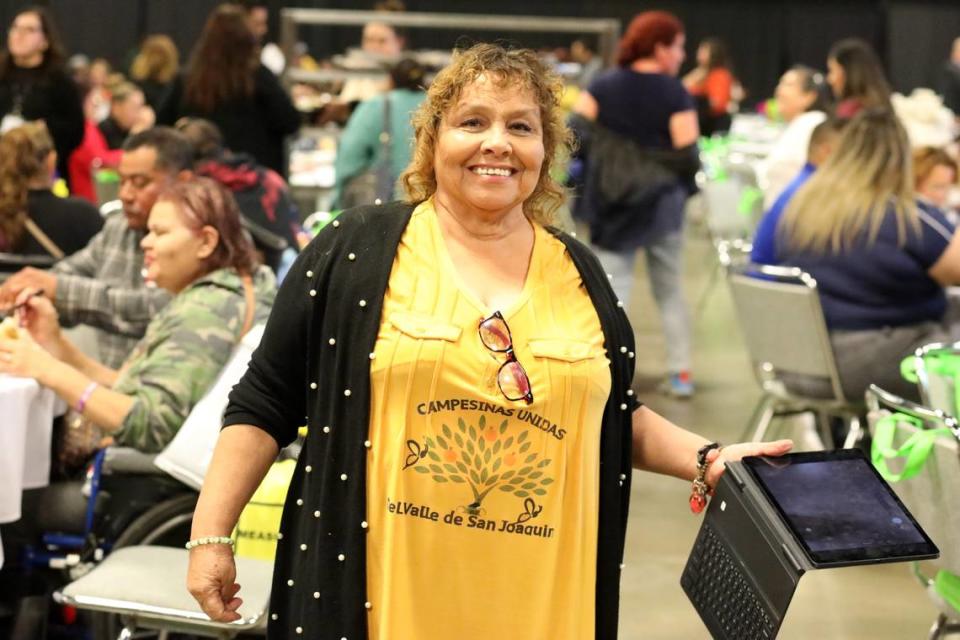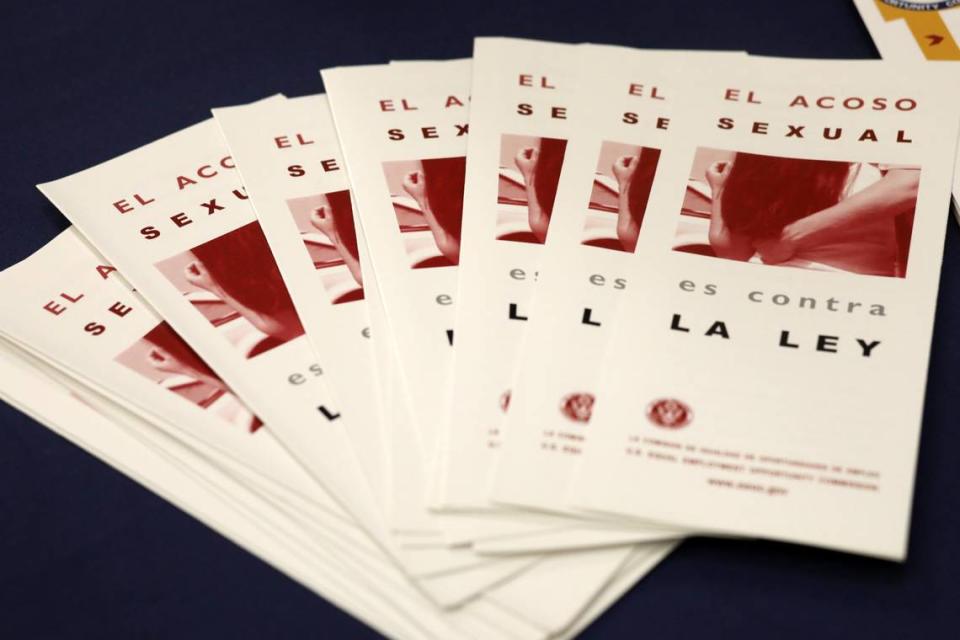Situations of sexual harassment are still a problem faced by women in the fields
Sandra García knows firsthand what it’s like to have experienced sexual harassment in the workplace.
García recalls working in an orange packinghouse when she was around 20 years old; the supervisor wanted her in a specific spot where he could observe her from an office window during her working hours. If she moved slightly out of his line of sight, the supervisor would come out of his office and place her back in front of the window.
“I knew he was watching me,” García said. “I felt uncomfortable that he was watching me.”
García, president of the organization Campesinas Unidas del Valle de San Joaquín, not only shared her own experience but also situations of harassment by foremen or supervisors that she has witnessed in the 40 years she has worked in the fields in each of the crews she was assigned to.
“And well, sexual harassment at work has always existed, and, well, nobody said anything,” García said.
Situations where foremen or supervisors get too close to girls under the pretext of teaching them how to pick or pack, and the girls and their mothers remain silent because they know that if they start saying something, they will be dismissed, García explained.
Harassment is not reported
The fear of losing their job is one of the main reasons why harassment goes unreported.
“So, what happens is that many women don’t speak up because they’re going to lose their job, right?” said García. “It’s something I’ve always seen.”
“Even older women are not exempt,” García said. “It’s a challenge that we women face in the field.”
Oscar Sanchez, consul of protection at the Consulate of Mexico in Fresno, mentioned that people remain silent about sexual harassment and don’t report it due to fear of job loss, or sometimes due to their immigration status.
“It happens everywhere, it happens in the fields, and these are issues that are not talked about, and we want them to come forward. We can guide them on how to report it, and justice will be served, obviously,” said Oscar Sanchez.
“We believe it’s something terribly underreported. People don’t come forward because they’re terrified to talk about it,” Oscar Sanchez said.
Linda Li, Outreach and Education Coordinator at the U.S. Equal Employment Opportunity Commission - San Francisco District (EEOC), stated that it’s challenging to quantify the number of sexual harassment cases in the fields since many incidents often go unreported or do not reach court simply because the affected individuals decided not to file a lawsuit, withdrew the complaint, or opted for a settlement.
“I feel that with the EEOC, you get the tip of the iceberg. Some people knew their rights and felt they could come and talk to a government agency,” Li said. “And we don’t account for all the people who were afraid to speak up, who didn’t feel comfortable coming to the government, who didn’t know what their rights were.”
Li said that many don’t even want to admit to themselves what’s happening. They just want to do their job, show up, and get paid. They don’t want to think about what to do with that additional problem.
“And I think what I would like to tell someone is that you are not alone. There are resources,” Li said. Oscar Sanchez said the consulate is a safe place for people to go and bring up their issues to find the best legal assistance for those cases.
“Because these are sometimes very sensitive issues. They can surround a person with a feeling of shame, and what we want is for them to learn about the resources they have so that justice can be served,” Oscar Sanchez said.
Education against harassment
As García experienced harassment problems firsthand, she mentioned that it was one of the things that led her to get involved, learn, attend workshops, and seek help.
“Because in my time, there was a lot of sexual harassment. I experienced a lot of it in the grape and orange fields,” said García, adding that many didn’t pay her, and took away bins, and crates.

“In this job, you have to become very brave, lose fear, and confront them many times,” said Garcia. The organization Campesinas Unidas del Valle de San Joaquín seeks to provide education and empowerment to female farmworkers in Kings, Fresno, Tulare, and Kern counties.
“We hold educational meetings in homes, parks, on the street –wherever they want, wherever they feel safe, outside of their workplace so they are not at risk of being seen by employers,” said García.
García mentioned that often people don’t recognize harassment signs, such as someone touching their hair, and it’s one of the things they need to learn. Besides educational meetings, García said Campesinas Unidas also goes to the fields to observe.
“If someone is experiencing harassment at work, the first step is to seek help from someone in an agency,” said Fausto Sánchez, a community worker at California Rural Legal Assistance, Inc. in the Lamont office. “Many of those working in the fields and facing harassment don’t want to report it to their foreman, supervisor, or company manager.”
Fausto Sanchez said that CRLA recommends talking to the employer’s human resources office, and if they don’t respond, seek assistance from legal aid agencies or other local organizations to report what’s happening.
“But don’t let it pass because there’s also a time limit to file such cases,” said Fausto Sanchez, adding that whether people have documents or not, they have the same rights to work in a safe environment.

Fausto Sanchez mentioned that CRLA provides information in various languages, including Mixteco, on labor-related issues such as harassment at events like the Agricultural Women Workers Conference, which took place on Thursday, November 16th, at the Visalia Convention Center.
Approximately 1,600 women registered for the annual conference, which marked its 25th year of providing information to female farmworkers.
Everyone has rights
Li said, “A piece of advice for agricultural workers facing harassment: know that you have rights. Protect yourself by documenting what happened –keep a journal. Write down what occurred and email it to yourself. Then, you’ll have a timestamped account of what happened.”
“We definitely perceive the need to provide this education. We understand that there are particular challenges that make these workers vulnerable,” Li said. “Because I think if people are concerned about whether they are documented or if their family members work there, there are many factors. Limited English proficiency makes it harder for them to feel secure in approaching (an agency).”
Li emphasized that the first thing one should do is know they have rights.
“I believe the first thing you should do is know that it’s not your fault, right? And that you have rights, and we want to help you, you know, and you’re not alone,” said Li.
“There are many truly excellent organizations that want to help you. It’s not at all your fault. It’s not up to you to solve the whole problem. And there are tools to help you,” Li added.
One of the services of the Consulate’s Protection Department is to guide people on issues such as sexual and workplace harassment.
“That’s right. We are generally interested in respecting labor rights. This includes the right to work in a dignified place, under dignified conditions, and the right to live a life free from discrimination, harassment, and, most importantly, sexual harassment,” said Oscar Sanchez.
Oscar Sanchez mentioned that from Monday to Friday during business hours, people can come to the protection department, share their concerns, and see if they can be referred to a specialized state or federal agency or even connect with lawyers specializing in labor issues, depending on the problem –whether it’s sexual harassment, discrimination, unjust termination, wage payment, etc.
“Any violation of workplace conditions can be brought to us, and we work closely with law enforcement agencies in both the State of California and the United States, as well as with lawyers. When a case warrants taking it to court, we do that too,” said Oscar Sanchez.
These Fresno residents maintain tradition of growing cempasúchil flowers
State Attorney General Rob Bonta reiterates promise to protect LGBTQ+ students from attacks

